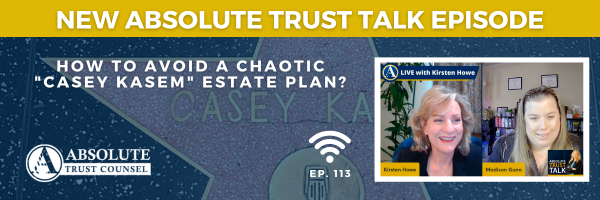Imagine this scenario: your cousin, David, dies without an estate plan here in California. He had no children or further descendants. He has no living siblings, parents, grandparents, or aunts or uncles, but he does have you, his first cousin on his dad’s side. His only first cousin that you are aware of. You petition the court to open a probate of David’s estate, with you as the administrator. You send out notice to all the relatives that you can. The court appoints you as administrator, you complete your duties as administrator and you file the final petition for distribution of the probate estate to you, as the sole heir. Surprisingly, a cousin named Judy files an objection to the distribution claiming that she is entitled to half of the estate as David’s other first cousin, on his mom’s side. You are surprised, because she is not a blood relative and was never adopted into the family. In fact, she was abandoned by her birth parents when she was two, and raised by Charles, David’s mom’s brother, and Charles’s wife. Charles, David’s uncle, would have been his heir, but he is deceased and has no children, other than Judy. A few more facts: Judy was raised in Indiana, which is where Charles lived and died. You never met Judy nor, apparently, did your cousin David.
The question is, does Judy get half of David’s estate under the laws of intestacy of California? California law does provide that a natural parent and child relationship can be established, without adoption, by clear and convincing evidence that the parent has openly held out the child as that parent’s own, provided that parent did not ever disavow the child. You argue that Indiana law should apply because that is where the “parent and child” relationship was created and lived. Under Indiana law, Judy would not be considered Charles’s child because he is not her biological father and he did not adopt her through the courts. If Charles had died without a will in Indiana Judy wouldn’t be able to inherit because she was not his child legally.
Judy argues that California law applies and that Charles held her out to be his daughter, Charles was listed on her marriage certificate as her father, she was listed on Charles’s death certificate as his daughter, Charles enrolled her in school from age 10 on as her father, and so on.
This was a real case, and the court held that, because David’s estate is being probated in California, California parentage laws apply and Judy does get to inherit half of David’s estate. This is not just a hypothetical, it is a new case that the California Court of Appeals decided in December 2022, Wehsener vs. Jernigan (86 Cal.App.5th 1311).
It seems far-fetched that some person in your family, who you didn’t actually think was related, legally, and maybe that you have never met, or even know about as a family member, could inherit from your estate. This is the law in California. If you die without a written estate plan, or any part of that plan fails and is to be distributed to your legal intestate heirs, those heirs could be determined by the court and could be similar to the situation described above. This means if your grandmother raised a distant cousin as their own, or a relative had a child too young and instead of a child raising a child, the baby was raised as the child’s sibling, it could really change the way the court determines who your heirs are upon your death. Of course, this goes for family members you don’t know, also, and if you don’t know them or aren’t particularly close, you may not know they are raising a child who is not their own biologically or legally.
To clarify, this applies to children being exclusively held out as a parent’s child, not a step-child. Step-children are classified as such because they have their biological parent and a step-parent resulting in two moms or two dads. This applies most typically when the biological parents are no longer in the picture.
The good thing about this case is that it is helpful to know how the courts would act so that everyone can either get an estate plan in place, or update their estate plan if they are concerned about a scenario like this happening in their family. There is language you can add to your estate plan to prevent a situation such as this and to possibly disinherit anyone that is not biologically related, or whatever definition you want to use for your beneficiaries. That is the beauty of an estate plan, it is customizable and flexible. Your written estate plan controls what happens after your death. The intestacy laws will only be applied if there are gaps in your estate plan. It is important to make sure there aren’t.



